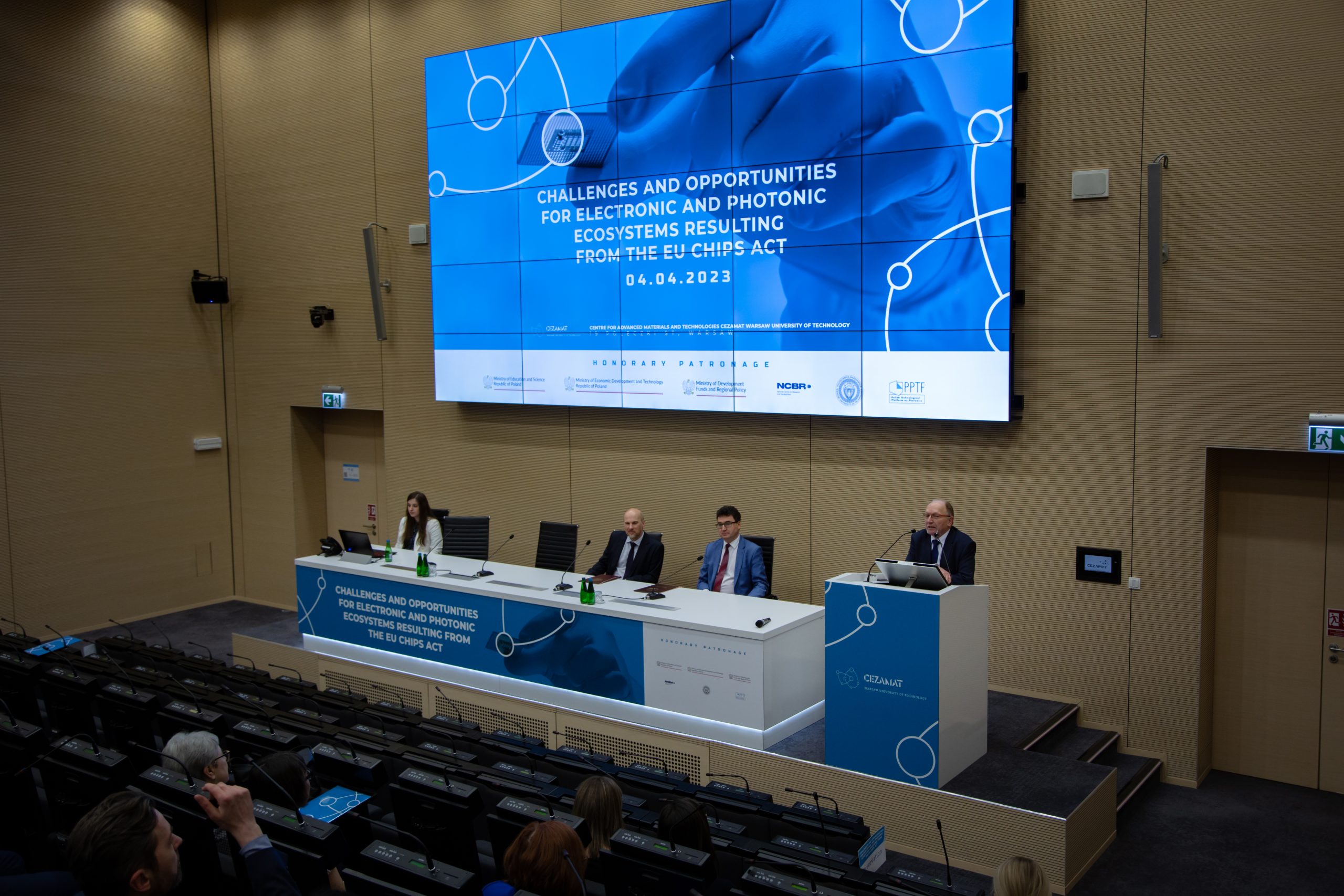International conference on electronic and photonic ecosystems at CEZAMAT
On April 4, 2023, a conference entitled “Challenges and opportunities for electronic and photonic ecosystems resulting from the EU Chips Act” was held at the Center for Advanced Materials and Technology of the Warsaw University of Technology CEZAMAT PW.
The conference dealt with activities undertaken by European Union countries at the institutional level in cooperation with universities, research institutes and companies in the field of microelectronics/nanoelectronics, photonics and microsystems in connection with the European Chips Act.
The purpose of the conference was to discuss the European Chips Act. The Act provides for the mobilization of investments from both public and private funds, which would ultimately lead to an increase in the production capacity of European Union countries from 10% to 20% of the global market in 2030. The Act provides for the mobilization of more than 43 billion euros for such investments, and the need to develop this industry is based on a study conducted by the European Commission, which showed that the industry expects demand for chips to double by 2030.
The conference provided a unique opportunity to look at the ambitious task facing Europe. We are, of course, talking about revitalizing and supporting the development of research and production in the field of microelectronics and photonics in the area of European Union member states. The discussion focused on national policies for conducting basic and applied research and development activities. As it was emphasized, the implementation of common ambitious goals is possible thanks to research projects, joint initiatives of science and business, and funds supporting both research units and companies implementing solutions into business practice.
During the conference, we had the opportunity to listen to speeches by Dr. Marco Ceccarelli from the European Commission, Dr. Yves Gigase – Executive Director of KDT JU and Dr. Adam Piotrowski – CEO of Vigo Photonics.
A key element of the conference was a panel discussion entitled “Implementation of the EU Chips Act from the perspective of the microelectronics and photonics ecosystems (education, R&D, SMEs/MMEs)”, which was moderated by Prof. Romuald B. Beck from the Center for Advanced Materials and Technology. The panel included Dr. Carmen Moldovan (Director of Research Center CINTECH, IMT-Bucharest, Romania), Dr. Georgios Fagas (EU Programmes Office, Tyndall National Institute, Ireland), Maciej Nowakowski (Director of Operations, Polish Technological Platform on Photonics, Poland), Prof. Francis Balestra (Director of SINANO Institute and Director of Research CNRS, IMEP-LAHC, France).
During the conference, it was pointed out that the current situation in the semiconductor industry requires the EU and individual member states to develop and implement a coordinated action plan that will accelerate the development and ensure a full supply chain of components for the industry, including the forecasting of possible disruptions in it, and in the event of their occurrence, the application of previously prepared corrective measures.
During the conference, a Cooperation Agreement forming the Microelectronics, Electronics and Photonics Cluster was signed. Membership declarations were submitted by 22 entities: companies, universities, research institutes and NGOs. The mission of the Cluster is to support the development of the Polish microelectronics, electronics and photonics industry by creating a sustainable framework for cooperation between entities and building a strong platform for dialogue and joint activities. The coordinator of the Cluster is the Polish Photonics Technology Platform, while the role of Leader of research cooperation is played by Warsaw University of Technology represented by CEZAMAT PW.
– I believe that the Microelectronics, Electronics and Photonics Cluster will allow for more effective cooperation between units operating in these areas in Poland – said Prof. Romuald B. Beck – Thanks to the fact that we have managed to bring together both research entities and companies, we will be able to implement the provisions of the EU Chips Act more efficiently, and our position and opinions will be more strongly visible in the discussion about the future of this industry.
Download the conference papers:
Marco Ceccarelli, “EU Chips Act – Challenges & opportunities”
Krzysztof Mieszkowski, “MAZOVIA EDIH – European Digital Innovation Hub of Mazovia”


































































































